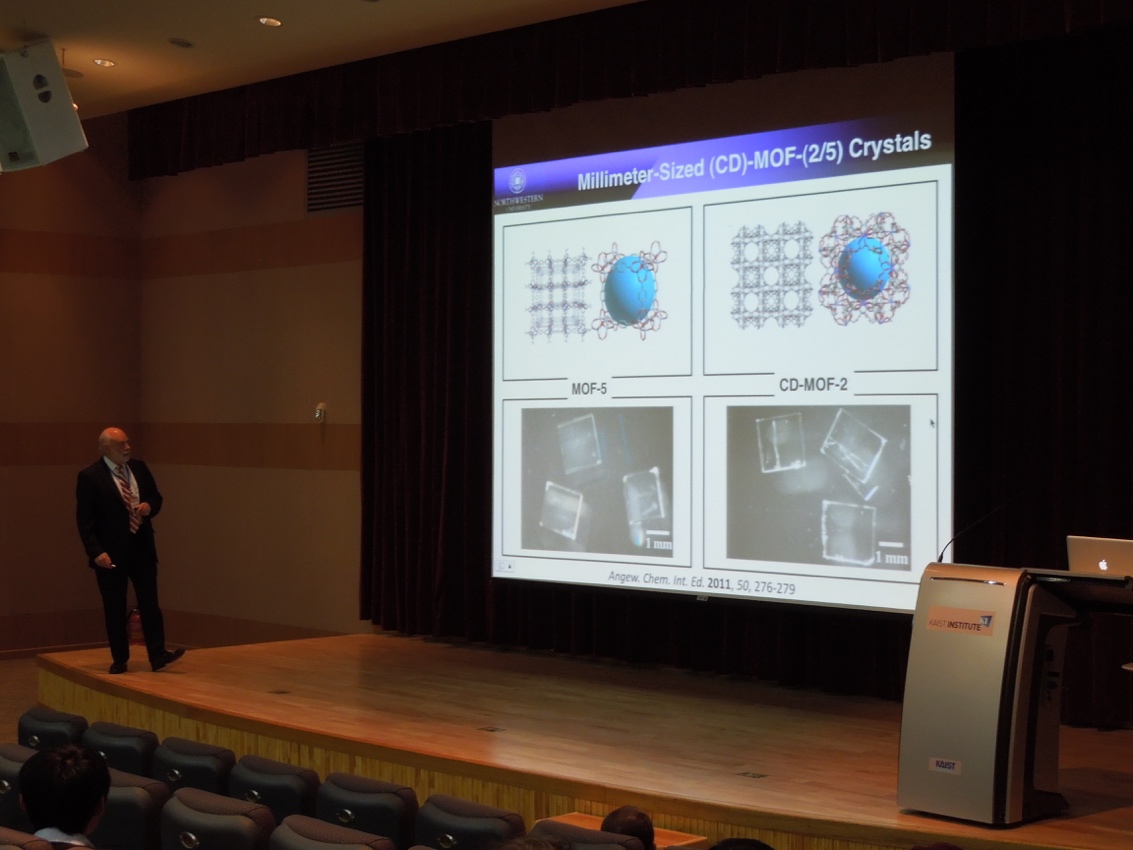people
J. Fraser Stoddart, who is Northwestern University’s Board of Trustees Professor of Chemistry and head of the Stoddart Mechanostereochemistry Group, received the 2016 Nobel Prize in Chemistry. He shares it with Professor Jean-Pierre Sauvage of the University of Strasbourg in France and Professor Bernard Feringa of the University of Groningen in the Netherlands.
Professor Stoddart’s relationship with KAIST dates to his term as a visiting professor from 2011 to 2013 at the Environment, Energy, Water and Sustainability (EEWS) Graduate School. The Nobel Committee awarded the prize to Professor Stoddart in recognition of his pioneering work on artificial molecular machines, a.k.a., nanomachines.
A molecular machine is an assembly of a discrete number of molecular components designed to perform machine-like movements as the result of appropriate external stimuli. Like their counterparts in the macroscopic world, molecular machines control mechanical movements and rotations in response to an energy input such as chemical reactions, light, or temperature. The most complex molecular machines, for example, are proteins in cells. Chemists have attempted to imitate these structures for potential applications including smart nanomedicines to track diseases such as cancer cells and deliver drugs to fight them. Other applications include next-generation miniature semiconductor chips, sensors, energy storage, space exploration, and armaments.
In 1991, Professor Stoddart developed artificial molecular machines based on a rotaxane. A rotaxane is a mechanically-interlocked molecular architecture in which a dumbbell-shaped molecule is encircled by a molecular ring called a macrocycle. He presented important research on the production of rotaxanes and demonstrated that a macrocycle could move along or rotate freely around the axle, a dumbbell-shaped molecule.
Professor Stoddart is also an expert in molecular electronics using molecules on the nanoscale as switches in computers and other electronic devices. In 2007, he created a large-scale ultra-dense memory device with reconfigurable molecular switches, the size of white blood cells but capable of storing information. This was a significant achievement towards the development of molecular computers that are much smaller and more powerful compared to today’s silicon-based computers.
KAIST has enjoyed a strong relationship with Professor Stoddart since he served as a visiting professor at the EEWS Graduate School from 2011 to 2013. The graduate school invited him to participate in the Korean government’s science and education program to foster world-class universities in the nation. At KAIST, he taught a course entitled “Nanomachines at the Scale of Molecules.” He also collaborated with Korean researchers on various projects including the publication of a joint research paper, “A Radically Configurable Six-State Compound,” in Science (January 25, 2013) with Professor Jang Wook Choi from the EEWS Graduate School and researchers from the United States, the United Kingdom, and Saudi Arabia.
Two doctors with KAIST ties have links to Professor Stoddart as well. In 2012, Dr. Ali Coskun, who worked with him as a postdoctoral research associate at Northwestern University, became an associate professor at the EEWS Graduate School where he conducts research on secondary batteries and gas storage with artificial molecular machines. Dr. Dong Jun Kim, a KAIST graduate, has been working at the Stoddart Mechanostereochemistry Group as a postdoctoral fellow since 2015.
Picture 1: Synthesis of a Rotaxane Described in the Journal of the American Chemical Society (JACS) in 1991

Picture 2: Professor J. Fraser Stoddart Giving a Presentation at a Workshop Hosted by the EEWS Graduate School at KAIST in 2011

- No Data